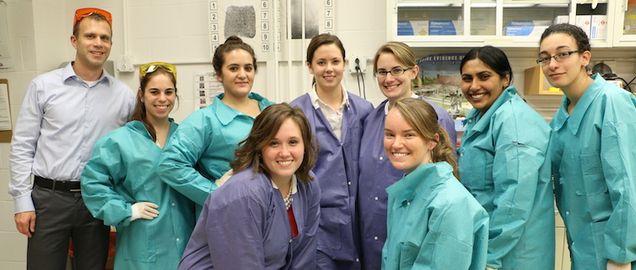About Forensic Science at Boston University

Boston University’s Graduate Medical Sciences is home to two world-class forensic science master’s programs: the MS in Biomedical Forensic Sciences and the MS in Forensic Anthropology. With approximately 90 students enrolled in both programs, a highly dedicated faculty, and world-class research facilities and instrumentation, students in our forensics programs are part of a strong community that supports them in their research and professional endeavors.
About the MS in Biomedical Forensic Sciences
Our Master of Science program in Biomedical Forensic Sciences trains aspiring and mid-career professionals in a variety of forensic disciplines related to crime scene investigation and evidence analysis. Professionals trained in these disciplines are crucial to today’s comprehensive forensic investigations. Completing this degree will qualify graduates to work as forensic scientists, DNA analysts, chemists, death investigators and crime scene responders at the local, state, and federal levels.
About the MS in Forensic Anthropology
The Master of Science program in Forensic Anthropology offers a variety of courses in forensic anthropological techniques and procedures, human anatomy, osteology, pathology, human remains recovery, death investigation, research design, expert witness testimony and forensic science. Completion of this program will prepare students to continue their graduate education in a doctoral program and/or work as a forensic anthropologist or medicolegal death investigator.
Location and Facilities
Both of BU’s forensic science master’s programs are located on the Boston University Medical Campus, which contains state of the art lecture halls, seminar rooms, sophisticated computerized teaching labs and Boston’s largest biomedical research park. In addition, the campus is in close proximity to Boston’s largest research park, the Office of Chief Medical Examiner for Massachusetts and the Boston Police Department Crime Laboratory.
Students in Boston University’s forensic science programs receive exceptional hands-on training opportunities, thanks to our outdoor research facility that includes:
- A secure area for decomposition studies
- A mock crime scene house
- Open fields, wooded areas and a cranberry bog
Broad Training for Careers in Forensic Science
Graduates of both programs are prepared to work with scientific evidence in criminal investigations, including evidence documentation, analysis, and courtroom testimony. Forensic professionals are in high demand in multiple industries:
- Homeland Security
- Law Enforcement
- Medical Examiner Offices
- Manufacturers of Forensic Products
- Forensic Laboratories
- Academia
Choosing between our two Forensic Science programs
While Forensic Scientists and Forensic Anthropologists often work together as part of investigative teams, their academic backgrounds vary significantly:
Biomedical Forensic Sciences:
- Admissions Prerequisites: BS in Chemistry or Biology
- Focus: Forensic biology & chemistry, toxicology, DNA
- Credits: 38
- Accreditation: FEPAC (BU’s program is among about 20 forensic graduate programs to receive this accreditation)
Forensic Anthropology:
- Admissions Prerequisites: BS in Archaeology or Anthropology
- Focus: Anatomy, skeletal anatomy, mortuary archaeology, osteology
- Credits: 42
- Accreditation: NEASC
